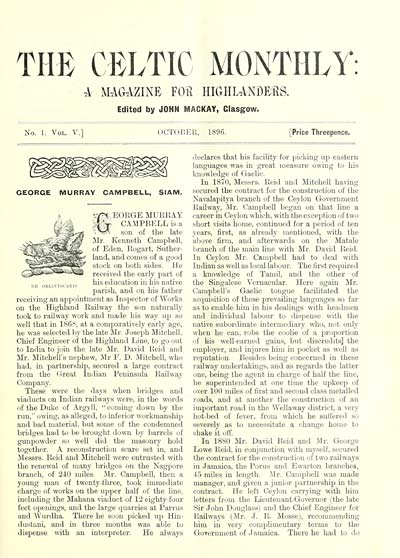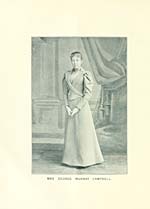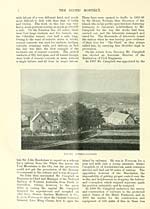Blair Collection > Celtic monthly > Volume 5, 1897
(13)
Download files
Complete book:
Individual page:
Thumbnail gallery: Grid view | List view

THE CELTIC MONTHLY:
:4 MAGAZINE FOR HIGHLANDERS.
Edited by JOHN MACKAY, Clasgow.
No. 1. Vol. V.]
OCTOBER, 1896.
[Price Threepence.
GEORGE MURRAY CAMPBELL, SIAM.
^/J^IItEORGE MURRAY
W^r CAMPBELL is a
.>^J son of the late
Mr. Kenneth Campbell,
of Eden, Rogart, Suther-
land, and comes of a good
stock on both sides. He
received the early part of
his education in his native
parish, and on his father
receiving an appointment as Inspector of Works
on the Highland Railway the son naturally
took to railway work and made his way u]) so
well that in 1S6><, at a comparatively early age,
he was selected by the late Mr. Joseph Mitchell,
Chief Engineer of the Highland Line, to go out
to India to join the late Mr. David Reid and
Mr. Mitchell's nephew, Mr F. D. Mitchell, who
had, in partnership, secured a large contract
from the Oreat Indian Peninsula Railway
Company.
These were the days when bridges and
viaducts on Indian railways were, in the words
of the Duke of Argyll, " coming down by the
run," owing, as alleged, to inferior workmanship
and bad material, but some of the condemned
bridges had to be brought down by barrels of
gunpowder so well did the masonry hold
together. A reconstruction scare set in, and
Messrs. Reid and Mitchell were entrusted with
the renewal of many bridges on the Nagpore
branch, of 240 miles. Mr. Campbell, then a
young man of twenty- three, took immediate
charge of works on the upper half of the line,
including the Mahana viaduct of 1"2 eighty-four
feet openings, and the large quarries at Parrus
and Wurdha. There he soon picked ujj Hin-
dustani, and in three mouths was able to
dispense with an interpreter. He always
declares that his facihty for picking up eastern
languages was in great measure owing to his
knowledge of Gaelic.
In 1870, Messrs. Reid and Mitchell having
secured the contract for the construction of the
Navalapitya branch of the Ceylon Government
Railway, Mr. Campbell began on that line a
career in Ceylon which, with the exception of two
short visits home, continued for a period of ten
years, first, as already mentioned, with the
aljove firm, and afterwards on the Matale
branch of the main line with Mr. David Reid.
In Ceylon Mr. Campbell had to deal with
Indian as well as local labour. The first required
a knowledge of Tamil, and the other of
the Singalese Vernacular. Here again Mr.
Campbell's Gaelic tongue facilitated the
acquisition of these prevailing languages so far
as to enable him in his dealings with headmen
and individual labour to dispense with the
native subordinate intermediary who, not only
when he can, robs the coolie of a proportion
i.if his well-earned gains, but discredits] the
employer, and injures him in pocket as well as
reputation. Besides being concerned in these
railway undertakings, and as regards the latter
one, being the agent in charge of half the line,
he superintended at one time the upkeep of
over 100 miles of first and second class metalled
roads, and at another the construction of an
important road in the Wellaway district, a very
hot-bed of fever, from which he sufl'ered so
severely as to necessitate a change home to
shake it off.
In 1880 Mr. David Reid and Mr. George
Lowe Reid, in conjunction with myself, secured
the contract for the construction of two railways
in Jamaica, the Porus and Ewarton branches,
4.5 miles in length. -Mr. Campbell was made
manager, and given a junior partnership in the
contract. He left Ceylon carrying with him
letters from the Lieutenant-Governor (the late
Sir John Douglass) and the Chief Engineer for
Railways (Mr. J. R. Mosse), recommending
him in very complimentary terms to the
Government of Jamaica. There he had to do
:4 MAGAZINE FOR HIGHLANDERS.
Edited by JOHN MACKAY, Clasgow.
No. 1. Vol. V.]
OCTOBER, 1896.
[Price Threepence.
GEORGE MURRAY CAMPBELL, SIAM.
^/J^IItEORGE MURRAY
W^r CAMPBELL is a
.>^J son of the late
Mr. Kenneth Campbell,
of Eden, Rogart, Suther-
land, and comes of a good
stock on both sides. He
received the early part of
his education in his native
parish, and on his father
receiving an appointment as Inspector of Works
on the Highland Railway the son naturally
took to railway work and made his way u]) so
well that in 1S6><, at a comparatively early age,
he was selected by the late Mr. Joseph Mitchell,
Chief Engineer of the Highland Line, to go out
to India to join the late Mr. David Reid and
Mr. Mitchell's nephew, Mr F. D. Mitchell, who
had, in partnership, secured a large contract
from the Oreat Indian Peninsula Railway
Company.
These were the days when bridges and
viaducts on Indian railways were, in the words
of the Duke of Argyll, " coming down by the
run," owing, as alleged, to inferior workmanship
and bad material, but some of the condemned
bridges had to be brought down by barrels of
gunpowder so well did the masonry hold
together. A reconstruction scare set in, and
Messrs. Reid and Mitchell were entrusted with
the renewal of many bridges on the Nagpore
branch, of 240 miles. Mr. Campbell, then a
young man of twenty- three, took immediate
charge of works on the upper half of the line,
including the Mahana viaduct of 1"2 eighty-four
feet openings, and the large quarries at Parrus
and Wurdha. There he soon picked ujj Hin-
dustani, and in three mouths was able to
dispense with an interpreter. He always
declares that his facihty for picking up eastern
languages was in great measure owing to his
knowledge of Gaelic.
In 1870, Messrs. Reid and Mitchell having
secured the contract for the construction of the
Navalapitya branch of the Ceylon Government
Railway, Mr. Campbell began on that line a
career in Ceylon which, with the exception of two
short visits home, continued for a period of ten
years, first, as already mentioned, with the
aljove firm, and afterwards on the Matale
branch of the main line with Mr. David Reid.
In Ceylon Mr. Campbell had to deal with
Indian as well as local labour. The first required
a knowledge of Tamil, and the other of
the Singalese Vernacular. Here again Mr.
Campbell's Gaelic tongue facilitated the
acquisition of these prevailing languages so far
as to enable him in his dealings with headmen
and individual labour to dispense with the
native subordinate intermediary who, not only
when he can, robs the coolie of a proportion
i.if his well-earned gains, but discredits] the
employer, and injures him in pocket as well as
reputation. Besides being concerned in these
railway undertakings, and as regards the latter
one, being the agent in charge of half the line,
he superintended at one time the upkeep of
over 100 miles of first and second class metalled
roads, and at another the construction of an
important road in the Wellaway district, a very
hot-bed of fever, from which he sufl'ered so
severely as to necessitate a change home to
shake it off.
In 1880 Mr. David Reid and Mr. George
Lowe Reid, in conjunction with myself, secured
the contract for the construction of two railways
in Jamaica, the Porus and Ewarton branches,
4.5 miles in length. -Mr. Campbell was made
manager, and given a junior partnership in the
contract. He left Ceylon carrying with him
letters from the Lieutenant-Governor (the late
Sir John Douglass) and the Chief Engineer for
Railways (Mr. J. R. Mosse), recommending
him in very complimentary terms to the
Government of Jamaica. There he had to do
Set display mode to: Large image | Transcription
Images and transcriptions on this page, including medium image downloads, may be used under the Creative Commons Attribution 4.0 International Licence unless otherwise stated. ![]()
| Early Gaelic Book Collections > Blair Collection > Celtic monthly > Volume 5, 1897 > (13) |
|---|
| Permanent URL | https://digital.nls.uk/75851137 |
|---|
| Shelfmark | Blair.57 |
|---|---|
| Additional NLS resources: | |
| Attribution and copyright: |
|
| Description | A selection of books from a collection of more than 500 titles, mostly on religious and literary topics. Also includes some material dealing with other Celtic languages and societies. Collection created towards the end of the 19th century by Lady Evelyn Stewart Murray. |
|---|
| Description | Selected items from five 'Special and Named Printed Collections'. Includes books in Gaelic and other Celtic languages, works about the Gaels, their languages, literature, culture and history. |
|---|

